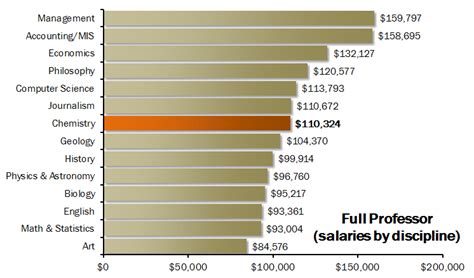College Professors' Earnings: What To Expect

Being a college professor is a prestigious and rewarding career path. However, many aspiring academics may wonder what to expect in terms of earnings. In this article, we will explore the factors that influence college professors’ earnings and provide insights into the potential salary range for this profession.
1. Academic Qualifications
One of the key factors that determine a college professor’s earnings is their academic qualifications. Professors who hold a Ph.D. or other advanced degrees in their field are generally positioned to earn higher salaries compared to those with lower qualifications.
1.1 Specialization
The specific field of specialization can also impact a college professor’s earnings. Certain disciplines, such as business, engineering, and computer science, tend to offer higher salaries compared to others. This is often due to higher market demand and the potential for industry partnerships and research funding.
1.2 Prestigious Institutions
Teaching at a prestigious institution can significantly impact a college professor’s earnings. Top-tier universities and colleges often have larger budgets and can offer higher salaries to attract and retain top talent. These institutions also provide opportunities for research grants and other forms of financial support.
2. Experience and Rank
Experience plays a vital role in determining a college professor’s earnings. As professors gain more teaching and research experience, they become eligible for promotions and higher ranks within the academic hierarchy. Higher ranks, such as associate professor or full professor, generally come with increased salaries and benefits.
2.1 Tenure-Track Positions
Securing a tenure-track position can have a significant impact on a college professor’s earnings. Tenured professors enjoy job security and often receive higher salaries compared to non-tenured faculty members. Tenure is typically awarded based on a combination of research productivity, teaching excellence, and service to the institution.
2.2 Administrative Roles
Assuming administrative roles within the academic institution, such as department chair or dean, can also result in higher earnings for college professors. Administrative positions often come with additional responsibilities and workload, but they can provide financial incentives and opportunities for professional growth.
3. Research and Grants
Research productivity and the ability to secure external grants can significantly impact a college professor’s earnings. Professors who actively engage in research, publish in reputable journals, and attract funding for their projects may receive additional compensation in the form of research stipends, bonuses, or salary supplements.
3.1 Sponsored Research Projects
Collaborating with industry partners or conducting sponsored research projects can be financially beneficial for college professors. These projects often come with additional funding, which can be used to support the professor’s salary or provide resources for their research activities.
3.2 Intellectual Property
If a college professor develops intellectual property, such as patents or copyrighted material, they may receive royalties or licensing fees. This can be an additional source of income and contribute to higher earnings.
4. Geographic Location
The geographic location of the college or university can also influence a professor’s earnings. Salaries can vary significantly based on the cost of living in a particular area. For example, professors working in major metropolitan areas or regions with a higher cost of living may receive higher salaries compared to those in rural or less expensive areas.
4.1 Cost of Living Adjustments
Some institutions offer cost-of-living adjustments as part of their compensation packages. These adjustments aim to offset the higher expenses associated with living in certain areas. They can be particularly relevant for professors considering job offers in locations with a higher cost of living.
4.2 State Funding and Budgets
State-funded institutions may have different budgetary constraints that influence professors’ earnings. Public universities often rely on state funding, which can fluctuate based on economic conditions and government priorities. This can affect the overall salary structure and potential for salary increases.
Conclusion
College professors’ earnings are influenced by a variety of factors, including academic qualifications, experience, research productivity, and geographic location. Specialization, institutional prestige, and administrative roles can also impact a professor’s salary. It is important for aspiring professors to consider these factors when planning their career path and setting expectations for their potential earnings.
Frequently Asked Questions
- What is the average salary for college professors?
- Do college professors receive benefits?
- Can college professors earn additional income through consulting or teaching outside of their institution?
- Are there opportunities for salary growth in the academic profession?
- How competitive is the job market for college professors?
The average salary for college professors varies depending on factors such as academic qualifications, experience, and institutional prestige. According to the Bureau of Labor Statistics, the median annual wage for postsecondary teachers in May 2020 was $80,790.
Yes, college professors typically receive benefits such as health insurance, retirement plans, and paid time off. The specific benefits may vary depending on the institution and employment status (e.g., tenured or non-tenured).
Yes, college professors can often earn additional income through consulting or teaching opportunities outside of their primary institution. These opportunities may include guest lectures, workshops, or research collaborations with other universities or organizations.
Yes, there are opportunities for salary growth in the academic profession. As professors gain experience, publish research, and assume higher ranks or administrative positions, they may become eligible for salary increases and additional financial incentives.
The job market for college professors can be competitive, especially in certain fields or disciplines. The demand for professors may vary based on factors such as enrollment trends, funding availability, and industry demand for specific expertise.

